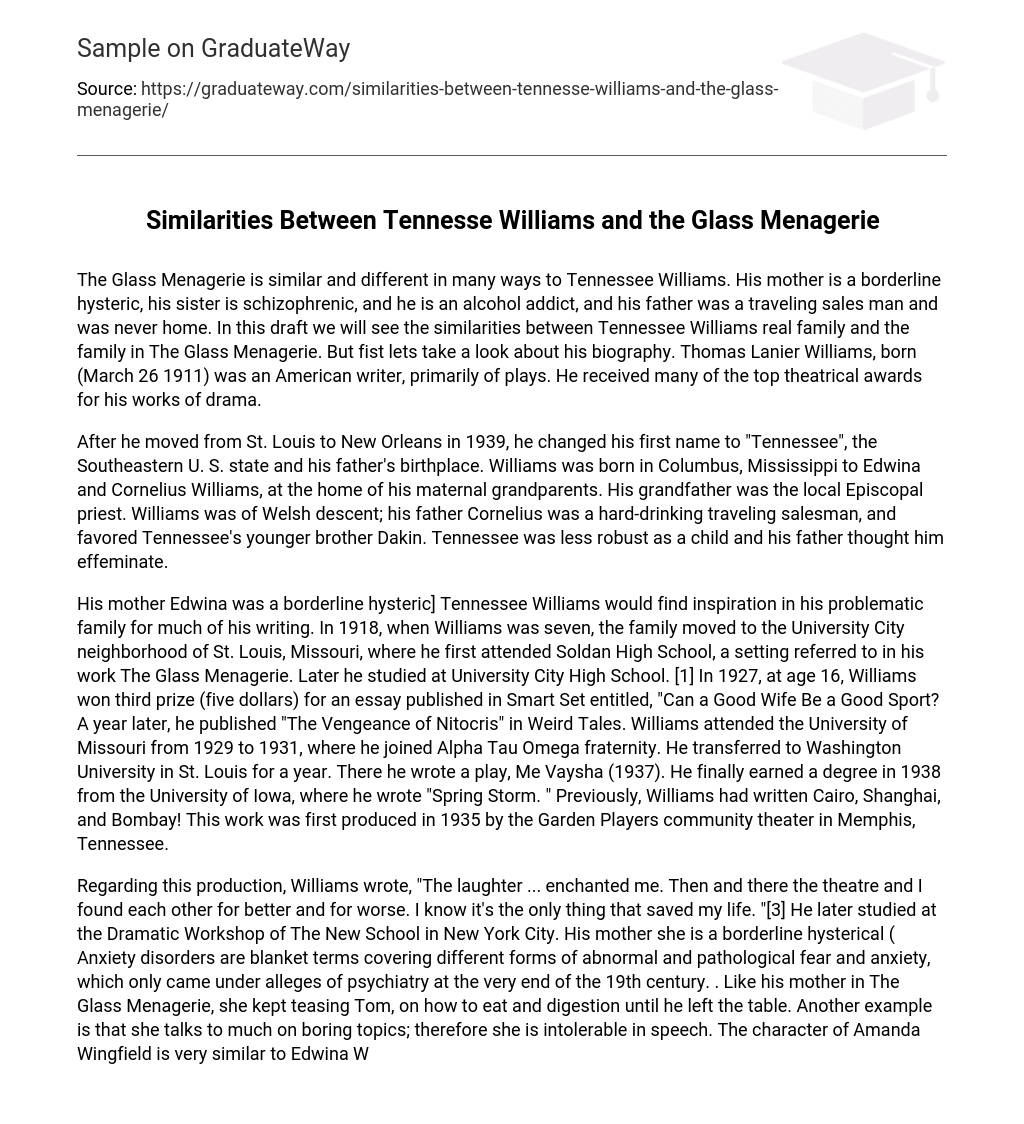In The Glass Menagerie, Tennessee Williams depicts similarities and differences between the story and his own life. Williams’ mother displayed borderline hysteric traits while his sister struggled with schizophrenia, and he himself battled alcohol addiction. Additionally, his father worked as a traveling salesman and was frequently absent. This rendition of the play delves into the parallels between Williams’ actual family and the fictional family portrayed in The Glass Menagerie. However, before exploring these connections, comprehending Williams’ personal background is essential. Born on March 26, 1911, Thomas Lanier Williams was a renowned American playwright who earned numerous prestigious awards for his theatrical works.
After moving from St. Louis to New Orleans in 1939, Tennessee Williams decided to change his first name to “Tennessee,” inspired by the Southeastern U.S. state and his father’s place of birth. He was born in Columbus, Mississippi at his maternal grandparents’ residence to Edwina and Cornelius Williams. Interestingly, his grandfather was a local Episcopal priest. It is worth noting that Williams had Welsh ancestry. His father, who worked as a traveling salesman and enjoyed drinking alcohol, favored Tennessee’s younger brother Dakin over him during their childhood years, likely because he perceived Tennessee as more delicate and effeminate.
Tennessee Williams was influenced by his mother, Edwina, who had borderline hysteria, greatly impacting his writing. In 1918, at age seven, his family moved to the University City neighborhood in St. Louis, Missouri – a place mentioned in his work “The Glass Menagerie.” He started at Soldan High School but later switched to University City High School.[1] At 16 in 1927, Williams wrote an essay titled “Can a Good Wife Be a Good Sport?” which won him third prize and was published in Smart Set. The following year, Weird Tales magazine published his short story “The Vengeance of Nitocris.” From 1929 to 1931, Williams studied at the University of Missouri as part of the Alpha Tau Omega fraternity. Then he transferred to Washington University in St. Louis for one year and wrote the play “Me Vaysha” (1937). In 1938, Williams completed his degree from the University of Iowa with his play called “Spring Storm.” Prior to this achievement, he premiered “Cairo, Shanghai and Bombay!” at Memphis’ Garden Players community theater in Tennessee during 1935.
Williams expressed that the laughter experienced during this production captivated and fascinated him, saving his life in the process. He proceeded to pursue studies at the Dramatic Workshop of The New School in New York City. Similar to The Glass Menagerie’s protagonist’s mother, Williams’ own mother displayed signs of borderline hysteria and incessantly bothered Tom at mealtime. Additionally, she had a tendency to excessively discuss mundane subjects, rendering her speech unbearable. Amanda Wingfield, a character in the play, bears close resemblance to Edwina Williams, the author’s mother, as both were domineering mothers who struggled with relinquishing their youth and had numerous romantic involvements in their pasts.
Both Amanda and Edwina displayed a lack of sensitivity towards their children’s emotions. Their efforts to steer their children towards a better future ultimately backfired, causing their children to become more distant. Similarly, like Tom’s sister Rose who suffered from Schizophrenia (a mental disorder characterized by abnormal thought processes and emotional responses), she too constantly daydreamed to escape from reality. As stated in The Glass Menagerie, “She lives in a world of her own — a world of — little glass ornaments.” This serves as an analogy highlighting her real-life Schizophrenia, mirroring the condition of Rose in the play.
Tennessee Williams had a real-life addiction to sleeping pills, which indicates his desire to escape from reality. This can be seen in The Glass Menagerie, where the character also seeks escape through the fire escape. Additionally, Williams had a drinking problem, similar to the character in the play who seeks adventure at the movies and comes home intoxicated. Tom, like Williams, coped with his bleak reality by writing poetry. Tom experiences guilt about wanting to leave his sister and mother to pursue his dreams, paralleling Williams’ own feelings of depression and guilt regarding his sister Rose’s mental health and his decision to distance himself from her.





